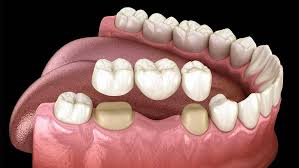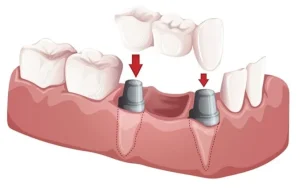What Is a Dental Crown?
A dental crown is a cap placed over a tooth to restore its shape, size, strength, and appearance. When a tooth is broken, worn down, severely decayed, or after a root canal, the remaining structure may not be strong enough to support a filling. A crown covers everything above the gum line and serves as the new outer surface of the tooth.
Crowns can also be used on dental implants or to anchor bridges.
Materials Used for Crowns
There are several materials used to make crowns, and each has its advantages:
-
Porcelain / Ceramic: Most preferred when appearance matters because these mimic the translucency and color of natural teeth.
-
Porcelain‐fused‐to‐metal: Offers strength of metal combined with the appearance of porcelain in visible areas.
-
Metal / Alloys / Gold: Very durable; often used on molars where chewing forces are high. Less aesthetic but great longevity.
-
Zirconia: Stronger ceramic material, resistant to cracking; good blend of strength and aesthetics in many modern practices.
The Process of Getting a Crown
Here’s what patients in Indianapolis can typically expect, including at Olive Branch Dentists and comparable practices:
-
Evaluation / Diagnosis
The dentist examines the tooth, takes X-rays or scans, assesses damage, decay, or crack. Determines whether a crown is needed versus other restorations. -
Tooth Preparation
The damaged or decayed portions are removed. The tooth is shaped to allow room for the crown. -
Impressions / Digital Scans
An impression or a digital scan is taken to send to the lab (for traditional crowns) or used in-office if same-day tech like CEREC is available. -
Temporary Crown (if needed)
If the final crown will take some time, a temporary crown protects the prepared tooth. -
Fabrication of the Permanent Crown
Either in a dental laboratory (traditional crowns) or chairside using milling tech for same-day crowns. Materials are matched for color, shape, bite alignment. -
Placement and Adjustment
When the permanent crown is ready, the dentist cements it in place, checks and adjusts for comfort, bite, and aesthetics.
How Olive Branch Dentists Handles Crowns
From information available, Olive Branch Dentists offers:
-
Crowns to strengthen or reshape teeth that are broken, worn, or partially destroyed by decay.
-
Materials: porcelain, metal, or a combination. Porcelain is often preferred due to its appearance and strength.
-
The fabrication is done in a dental lab based on impressions, so they follow the traditional two-appointment process.
Benefits of Getting a Crown
-
Restores strength to teeth that would otherwise break or become more damaged.
-
Prevents further decay or infection by sealing and protecting the remaining tooth.
-
Improves appearance: shape, color, alignment can be corrected.
-
Restores normal chewing, biting, speech function.
-
Helps prior dental treatments, such as after root canal.
Lifespan and Care
-
A well-made crown properly fitted and cemented should last many years. Estimates often range from 10-15 years, sometimes more, depending on material, wear, oral hygiene, bite force, and habits like grinding or chewing very hard items.
-
Good oral hygiene is key: daily brushing, flossing, avoiding excessive force or grinding, using a night guard if needed.
-
Regular dental checkups ensure early detection of any issues around the margins or beneath the crown.
When Is a Crown Recommended?
Crowns are suggested when:
-
Decay or damage is too big for a regular filling.
-
Tooth is cracked or broken.
-
After root canal treatment, to protect the remaining tooth structure.
-
For cosmetic reasons: misshapen or discolored teeth.
-
To anchor or complete a dental implant.
Considerations & What to Ask Your Dentist
-
Material choice: What works best for your tooth location (front vs. back), aesthetic goals, durability, and cost.
-
Cost and Insurance: Dental crowns are more expensive than fillings. Insurance might cover part, especially if they are medically necessary, not purely cosmetic. Ask your provider.
-
Treatment time: Traditional crowns typically require two visits, with a waiting period while the lab makes the crown. Same-day options speed this up but may have limitations.
-
Fit and comfort: Ensuring proper fit is crucial to avoid bite problems, irritation, or infection.
-
Lab quality and dentist’s experience: Crowns are custom made and craftsmanship matters, both in shaping and in matching color, anatomy, and function.
Summary
If you’re in Indianapolis and have a tooth that’s cracked, decayed, or otherwise compromised, a crown can restore its function and appearance. Olive Branch Dentists provides porcelain, metal, or mixed crowns, crafted in a lab and cemented onto your prepared tooth. With good care, a crown can serve you for many years. Before proceeding, talk through material options, expected lifespan, cost, and comfort with your dentist to make sure you get a crown suited to your needs.







